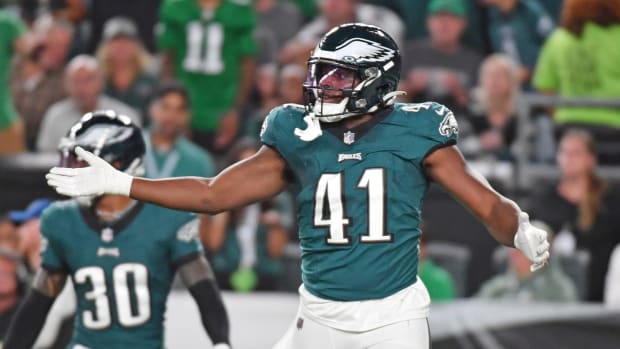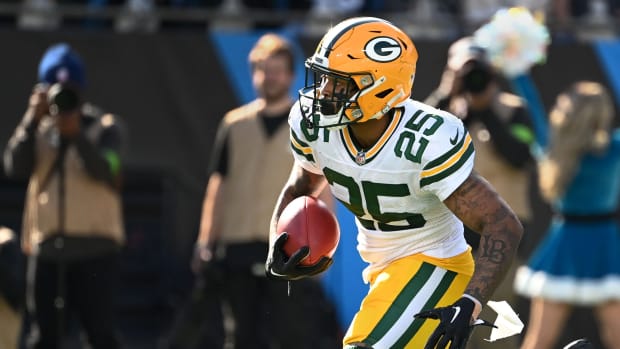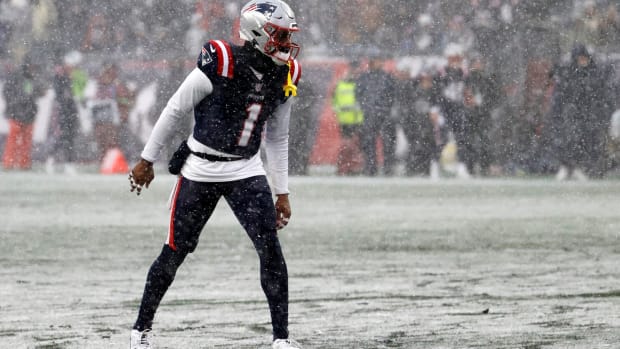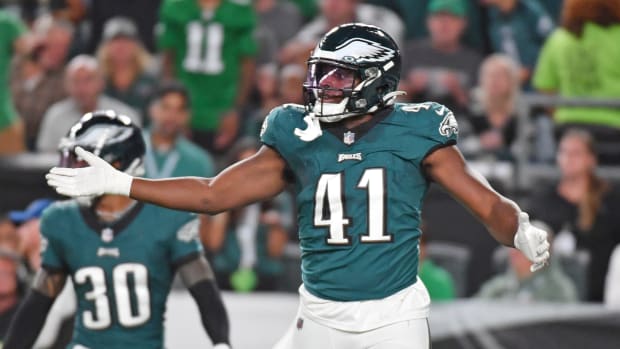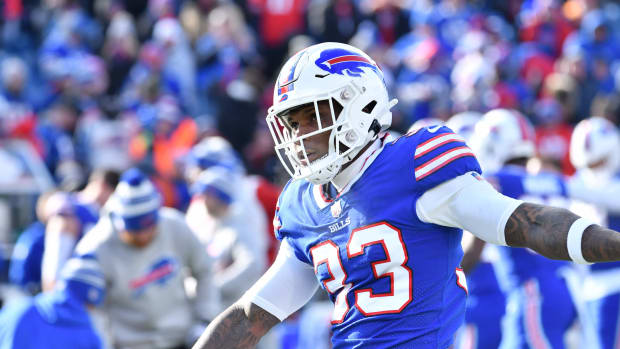Eight things to expect ahead of Tom Brady's third district court hearing
Will the Deflategate litigation finally run out of air this week? Don’t hold your breath.
On Monday, U.S. District Judge Richard Berman will preside over the third and likely final district court hearing on whether NFL commissioner Roger Goodell lawfully upheld Tom Brady’s four-game suspension. Assuming a settlement is not reached in the meantime, Judge Berman is expected to make a decision by Friday, Sept. 4. Any decision would be subject to appeal by either side to the U.S. Court of Appeals for the Second Circuit.
Here are eight keys for what to expect on Monday and beyond:
I. This is the last time the attorneys can persuade Judge Berman: Expect both sides to bring their “A” game
Like in their previous two hearings, attorneys for the NFL and NFLPA will meet in the Daniel Patrick Moynihan U.S. Courthouse for a mixture of public and private discussions. As before, Judge Berman will ask the attorneys questions about their lines of reasoning and he’ll offer brief commentary on their responses. Brady and Goodell have been ordered to attend Monday’s hearing, although neither is expected to play any role beyond sitting near the attorneys. Similarly, neither witness testimony nor introduction of evidence is expected. Instead, Monday’s session will entail a new round of discussion and debate between Judge Berman and the attorneys. This time, though, both sides will feel much more pressure: Judge Berman is likely on the verge of making a decision.
Judge Berman will likely center Monday’s discussion on relatively narrow and technical questions of law. By this point, the judge is already well versed on the NFL and NFLPA’s core arguments. In sum, the NFL contends that Article 46 of the collective bargaining agreement sufficiently accorded Goodell with sweeping discretion when he adopted the role of hearing officer (arbitrator) in presiding over Brady’s appeal, and that both federal law and case precedent compel Judge Berman to honor that deference. The NFLPA, in contrast, asserts that the totality of problems that arose in the NFL’s punishment of Brady establish that the league violated the law of the shop, which requires fairness and consistency in arbitration awards. The only remedy to correct the resulting harm, the NFLPA reasons, is for Judge Berman to vacate Goodell’s decision and consequently lift Brady’s suspension.
While it is impossible to predict which questions Judge Berman will pose on Monday, there’s a good chance he’ll address arguments recently raised by both sides.
II. NFL’s key arguments for Monday’s hearing
Earlier this week, the NFL filed a letter in which NFL attorney Daniel Nash attempted to debunk the relevance of 19 court decisions previously cited by the NFLPA. The 19 decisions all involve a federal judge vacating an arbitration award, which is the exact remedy Brady seeks. Nash wrote that none of these 19 decisions are on point, since, in Nash’s view, they concern an arbitrator either ignoring an express term in the CBA or basing an award on a concept that falls outside the CBA. According to Nash, neither of these circumstances exists for Brady. Nash insists that Brady was punished in accordance with the far-reaching language of Article 46, which, as worded, permits player punishment for any conduct the commissioner regards as “detrimental to the league.” Nash further tried to distinguish the 19 decisions by stressing they involved a neutral arbitrator unlike Goodell.
To bolster its legal arguments, the NFL has underscored the U.S. Supreme Court’s 2001 decision in MLBPA v. Garvey. This case centers on former San Diego Padres first baseman Steve Garvey, who was the National League’s MVP in 1974 and a 10-time All-Star, and his arbitration over whether he was a victim of MLB collusion (in the late 1980s some MLB teams conspired to suppress player wages). A neutral arbitrator rejected Garvey’s claim, raising questions about his evidence. Garvey then petitioned a federal district judge and later a three-judge federal appeals court to vacate the arbitrator’s award. Garvey convinced the appellate court to do so, as it reasoned that the arbitrator’s assessment of evidence “bordered on the irrational.” The U.S. Supreme Court, however, reversed the appeals court and held against Garvey, concluding that even when an arbitrator’s decision is impacted by factual errors or misunderstandings, a federal court must not disturb the award. Garvey v. MLBPA is an excellent decision for the NFL because it accentuates the high threshold necessary for a federal judge to vacate an arbitration award. Yet as explained below, the NFLPA can raise important distinctions between the Garvey case and Brady’s case. One significant distinction is that the arbitrator in Brady’s arbitration—Goodell—was clearly not neutral.
III. NFLPA’s key arguments for Monday’s hearing
In a letter responding to Nash, NFLPA attorney Jeffrey Kessler dismissed Nash’s reasoning as ignoring both law and precedent. During Monday’s hearing, expect Kessler to argue that Brady was punished for concepts that clearly fell outside the CBA. Along those lines, the NFLPA has highlighted the multiple sources of rules cited by the NFL to punish Brady. For instance, attorney Ted Wells wrote that his investigation was governed by the Policy on Integrity of the Game and Enforcement of Competitive Rules, while NFL executive vice president Troy Vincent, the author of the letter to Brady announcing his suspension, cited the Game Operations Manual as a key document. As explained in an earlier SI.com column, neither the Policy on Integrity nor the Game Operations Manual was subject to collective bargaining. This suggests that neither document authorized Brady’s suspension and consequently Brady lacked adequate notice as to what rules governed his punishment.
How Brady, Goodell could reach a settlement in Deflategate case
The NFLPA also objects to the NFL’s increasingly damning characterizations of Brady’s alleged wrongdoing. Without clear explanation or the disclosure of new evidence, Brady’s supposed role in a so-called ball deflation conspiracy has worsened from “general awareness” to active scheming. Kessler will surely remind Judge Berman on Monday that altering the rationales for punishing Brady goes to the fairness of the disciplinary process.
In addition, watch for Kessler to also stress the unique qualities of Goodell serving as the hearing officer (the arbitrator). Unlike in other cases cited by either the NFLPA or NFL, including the aforementioned MLPBA v. Garvey, Goodell was not merely functioning as the arbitrator. He was also the architect of the NFL’s investigation and the person who decided Brady’s punishment. While Article 46 generally permits this unusual arrangement, the NFLPA contends that it was fundamentally unfair for it to be employed in Brady’s appeal. This is especially true, the NFLPA contends, given that unlike in normal arbitrations, Brady had no ability to demand Goodell be replaced on grounds he was biased. To attempt to show that bias influenced Brady’s appeal, the NFLPA has objected to the inability of Brady’s attorneys to speak with a particular witness—NFL general counsel Jeff Pash, who edited the Wells Report—during Brady’s appeal hearing.
IV. Judge Berman could issue his decision as soon as Monday
The NFL and NFLPA have asked Judge Berman to issue a decision by Friday, Sept. 4, which is one day before Brady’s suspension is set to begin. If Brady’s suspension starts, he would be barred from the Patriots’ facilities and unable to practice. Judge Berman has not guaranteed that he will make a decision by Sept. 4. In fact, he recently implied that his decision could necessitate more time. The Patriots season-opener will be played on Thursday, Sept. 10. If Brady is serving a suspension on that date, backup quarterback Jimmy Garoppolo is expected to start in his place.
The odds are very high that Judge Berman will issue a ruling by Sept. 4th. He surely realizes the importance of that date to the parties. Also, although the “correct” decision in this case is debatable, the underlying facts and arguments are not especially complicated. It is possible that Judge Berman has already made up his mind and has only delayed announcing a decision in hopes that the parties reach a settlement in the meantime.
If Judge Berman is convinced by Monday that the parties simply won’t settle, it’s possible that he could issue a ruling “from the bench.” This refers to a judge orally announcing his decision to the parties while they are in court or the judge letting the parties know how he will later rule in a written order. Attorney Alan Milstein, who has litigated against the NFL and tried cases before Judge Berman, believes there is a good chance Judge Berman will announce his decision on Monday.
“Considering the parties have thus far rejected settlement,” Milstein observes, “I see no other reason for the hearing than to end this litigation.”
• MMQB: A trip inside the Sports Illustrated archives
V. If Judge Berman rules for Brady, Brady would be eligible to play, but NFL might seek to punish him again
If Judge Berman rules for Brady, it would mean that Goodell’s decision to uphold Brady’s suspension is vacated. Consequently, Brady’s suspension would be lifted. He would then be eligible to play against the Steelers on Sept. 10 and in other games thereafter.
Ten years since Katrina: Oral history of the Saints and their Superdome
But the NFL could still complicate Brady’s eligibility to play games. Specifically, the NFL could seek to punish Brady again, since the vacating of Goodell’s decision and the lifting of Brady’s suspension would not automatically prevent the NFL from launching a new disciplinary investigation. In order for the NFL to be barred from re-punishing Brady, Judge Berman’s order would need to expressly preclude the NFL from punishing Brady for Deflategate-related matters.
Alternatively, Judge Berman could vacate Goodell’s order and then impose procedural limits on the NFL should it seek to re-investigate Brady. For instance, the judge could instruct the NFL that it can only use a neutral arbitrator, whether it’s former NFL commissioner Paul Tagliabue (who was the arbitrator for the Bountygate appeals) or former U.S. District Judge Barbara Jones (the arbitrator for Ray Rice’s appeal) or someone similarly without a stake in the outcome. As another variation, Judge Berman might stay (delay) the carrying out of Brady’s suspension until an appeal before the U.S. Court of Appeals for the Second Circuit could be heard.
Although it is possible that Judge Berman will issue a multilayered order such as one described above, it’s unlikely. Many judges perceive the appropriate scope of their review as limited to the specific legal questions presented in a case. Remember, the NFL and NFLPA have asked Judge Berman to confirm or vacate the arbitration award, not take additional steps that might be construed as modification of the award or, more dramatically, a transformation of Article 46 of the CBA. Judge Berman also knows that if any part of his order “goes too far,” his entire order would be more susceptible to being reversed on appeal.
VI. How the NFL would appeal a loss to the U.S. Court of Appeals for the Second Circuit
While it is unlikely the NFL would launch a new investigation into Brady, it is very likely the league would file an appeal of Judge Berman vacating Goodell’s decision. Some have speculated that the NFL might drop the case if Judge Berman rules for Brady. The reasoning most often mentioned is that team owners would pressure Goodell to “let it go” and focus instead on the business of football. I doubt Goodell would do so. He has staked a significant portion of his legacy as NFL commissioner on the aftermath of Deflategate. Also, if Goodell drops the Brady case, it would create incentives for future suspended players to go to court.
Instead, I believe the NFL would appeal a loss to the U.S. Court of Appeals for the Second Circuit, which would assign three judges to serve on an appellate panel. The NFL would also request an expedited review from the Second Circuit. An “expedited review,” however, would not mean an instantaneous one. Even if the Second Circuit agrees to act quickly, it would likely take a least a couple of months before rendering a decision. If the request to expedite is not granted, the Second Circuit would probably not make a decision until spring or summer 2016. Moreover, if Brady wins before Judge Berman, but loses the appeal, he would serve his four-game suspension at some later date—perhaps while the Patriots are playing crucial games this December or perhaps to start the 2016 regular season.
SI Vault: As team faces uncertainty, Saints rush to help NOLA after Katrina
The odds of Brady winning before Judge Berman but losing on appeal are impossible to calculate. Although federal appeals courts sustain most decisions by district court judges in arbitration award cases, Brady v. NFL is unpredictably unusual. It involves a bizarre set of facts but more significantly there is no available data on how federal appeals courts treat arbitration awards where the arbitrator was both not neutral and played multiple roles in the disciplinary process. Goodell’s role as the so-called “judge, jury and executioner” of NFL justice is unusual, to put it mildly.
Some have speculated that since the NFL won before the Second Circuit in an appeal of Maurice Clarett’s age eligibility rule case in 2004, the NFL would be poised to defeat Brady in an appeal (as a disclosure, I was a member of Clarett’s legal team). This logic is badly misplaced.
First, Clarett’s case involved antitrust claims surrounding an NFL rule that required amateur players be three years out of high school before they were eligible for the NFL draft. Brady’s case, in sharp contrast, involves the commissioner serving as an arbitrator in reviewing Brady’s alleged involvement in a supposed ball deflation scheme. The NFL defeating Clarett on legal issues unrelated to Brady’s situation does not make the NFL more likely to defeat Brady.
Second, there are 23 possible judges (13 active and 10 senior) on the Second Circuit who could be selected to serve on the three-judge panel. They are all very different. Some are relatively pro-labor, some are relatively pro-management and some embrace ideologies that are impossible to categorize. Taken together, the 23 judges were nominated by six different U.S. Presidents: Barack Obama, George W. Bush, Bill Clinton, George H.W. Bush, Ronald Reagan and Jimmy Carter. Which of the 23 judges will hear Brady’s appeal? It is unknown and won’t be determined until a notice of appeal is filed. However, we know it won’t be the same three-judge panel that heard Clarett’s appeal. One of those judges, Sonia Sotomayor, is now on the U.S. Supreme Court. Adding more uncertainty, a federal district court judge could be assigned to serve on the three-judge appellate panel. This happened in the Clarett case, with U.S. District Judge Lewis Kaplan serving on the panel.
Bottom line: Predicting how the Second Circuit would rule on an appeal in Brady v. NFL is an exercise in conjecture.
• BENOIT: Loss of Suh leaves Lions defense in tight spot
VII. Immediate Impact of Judge Berman ruling for the NFL: The NFLPA would appeal and also file an emergency motion for a “stay”
While Judge Berman has seemed critical of the NFL’s legal arguments, federal judges normally don’t vacate arbitration awards. It is quite possible that the judge will rule, reluctantly or not, for the NFL. If he does, the NFLPA, on Brady’s behalf, would immediately appeal to the Second Circuit and also file an emergency petition for a “stay.” The petition for a stay would first be made to Judge Berman. If that fails, the NFLPA would then petition the Second Circuit for a stay. If granted, a stay would prevent the NFL from carrying out the four-game suspension until the Second Circuit decides on the appeal. Brady, in other words, would not be suspended to start the season. In fact, given that it could be many months before the Second Circuit decides on the appeal, Brady might be able to play the entire 2015 regular season without disruption.
But would the NFLPA be awarded a stay?
A stay pending an appeal is considered an “extraordinary remedy” in law and is seldom granted. The NFL would be confident that neither Judge Berman nor the Second Circuit would grant a stay. The NFLPA, of course, would disagree. To obtain a stay, the NFLPA would need to prove that Brady has, on balance, the stronger argument in consideration of four key prongs:
- Brady has a substantial probability of winning the appeal.
This prong would likely work against the NFLPA. Appellate courts usually don’t reverse district judges in their review of arbitration awards. But as explained above, Brady v. NFL is an unusual case without clear precedent. If Judge Berman does not grant a stay after upholding Brady’s suspension, a great deal would depend on which three Second Circuit judges are assigned to consider the NFLPA’s petition for a stay. Along those lines, how highly the three-judge panel regards Judge Berman and his understanding of the law would be meaningful. John Greabe, a constitutional law professor at the University of New Hampshire School of Law who for 17 years served as a clerk to federal appeals court judges, tells SI.com, “In my experience, the reputation of the district court judge for care and judiciousness can influence the deference accorded by an appeals panel to that judge's judgment calls.” This is especially true, Greabe observes, “when it comes to provisional relief such as a stay.”
- Brady would suffer irreparable harm if a stay isn’t granted.
This would be the most divisive and interesting prong for Brady should the NFLPA seek a stay on his behalf.
In law, “irreparable harm” refers to a harm that is likely to occur before a court can grant permanent relief and that cannot be remedied once it occurs. Often, although not always, an irreparable harm is one that cannot later be cured by money.
The NFL would insist that Brady would not suffer irreparable harm because he would only miss four game checks. After all, if months from now the Second Circuit rules for Brady, the NFL would pledge to reimburse him for the missed checks. The NFL would insist that Brady missing four games would be a mere financial harm that imposes no other burden on Brady’s life or livelihood.
From 2001 to now: Vick, Brees and their wildly divergent NFL careers
The NFLPA, in contrast, would argue that Brady missing the first four games would inflict harm that can’t be remedied. For starters, those four games are each unique and can never be replayed. The NFLPA could also stress that Brady’s reputation would be harmed and that reimbursed game checks would not cure that type of financial harm. Further, the NFLPA would insist that the inability of Brady to practice and help his team win those four games would harm the Patriots’ season and the team's chances for the playoffs. And at age 38, Brady’s career might not continue for many more years, meaning a 2015 season ruined by missing the first four games would be especially harmful.
The NFLPA would have some case law on its side. Daniel Wallach, a partner at Becker & Poliakoff, P.A., contends that the players’ association would have a good shot at establishing irreparable harm. He cites the Second Circuit's 1995 ruling in Silverman v. MLB Player Relations Committee, which concerned a Major League Baseball players strike. In that case, the Second Circuit held, “given the short careers of professional athletes and the deterioration of physical abilities through aging, the irreparable harm requirement has been met.”
Wallach contends that Silverman is a crucial case for Brady in the event the NFLPA seeks a stay pending an appeal.
“Athletes have a limited time to ply their trade.” Wallach stresses. “This is especially so for an older player who is in the twilight of his career.” For this reason, Wallach adds, “courts have generally recognized that a professional athlete will suffer irreparable harm if kept out of competition for any extended period of time, even just a few games.”
• KING: The Saints and Katrina, 10 years later
By way of example, Wallach points to the StarCaps case involving Kevin Williams and Pat Williams (who were each suspended four games by the NFL for violating the league's anti-doping policy). In that case, Minnesota District Judge Gary Larsen acknowledged that the “loss of NFL playing time is sufficient to constitute irreparable harm.” After the case was transferred to federal court, U.S. District Court Judge Paul Magnuson likewise acknowledged that “[i]mproper suspensions can undoubtedly result in irreparable harm.” He noted that a suspended player may miss out on postseason awards, such as making the Pro Bowl, and that such honors “carry significant economic and non-economic benefits.” Judge Magnuson further observed that some players “are central to their team’s chances of making the playoffs.” Of particular interest to Brady and the Patriots, Judge Magnuson also reasoned that “[t]he failure to make the playoffs and the effect of that failure on the players, teams, and fans is not compensable monetarily and is therefore an irreparable harm.”
Wallach notes the “factual similarities” between the StarCaps case and Brady’s situation, in that both involved four-game suspensions by the NFL. He maintains that Brady can make “an even stronger showing of irreparable harm due to his advanced age and the fact that Brady, as the star quarterback, is arguably more vital to his team’s playoff chances than were Kevin Williams and Pat Williams.”
Wallach also points to Jackson v. NFL, a 1992 decision by Minnesota Federal Judge David Doty, who observed that “the existence of irreparable injury is underscored by the undisputed brevity and precariousness of the players' careers in professional sports, particularly in the NFL.” Wallach believes that the ephemeral duration of a NFL career, particularly for a highly paid veteran player, makes the irreparable harm element a “clear-cut” win for Brady. The NFL, of course, would object to such reasoning as speculative. It would be an interesting battle.
- Brady being awarded a stay would not substantially injure the NFL.
The NFLPA would also need to establish that a stay for Brady would not substantially injure the NFL. The NFL would contend that Brady receiving a stay would undermine the commissioner’s collectively bargained authority to punish players. The league would also warn that if Brady receives a stay, federal courts should expect to see more players seeking their intervention.
The NFLPA, in contrast, would stress that a stay would not prevent the NFL from suspending Brady. It would only prevent the NFL from suspending Brady pending his appeal. If the Second Circuit later rules for the NFL, the NFL could carry out the suspension at that time.
- Brady being awarded a stay would be in the public’s interest.
Whether Brady receiving a stay would be in the public’s interest would be easy to measure if the “public” referred only to New Englanders. Unfortunately for Brady and the Free Brady movement, the “public” is not so geographically confined. Instead, it refers more broadly to notions of justice and fairness in the United States. The NFLPA would assert that Brady’s punishment reflects anything but justice and fairness, while the NFL would highlight that Brady, as a member of the NFLPA, willingly accepted the system of justice about which he now complains.
• BANKS: Insight out of balance in latest set of talking points around NFL
VIII. The wildcard of a settlement remains in play
As I wrote earlier in the week, the NFL and NFLPA could reach a settlement at any time before Judge Berman issues a decision. Often, two warring sides in litigation come to a deal at the last minute. While such a deal between the NFL and NFLPA seems unimaginable right now, far stranger things have happened.
Michael McCann is a Massachusetts attorney and the founding director of the Sports and Entertainment Law Institute at the University of New Hampshire School of Law. In the fall 2015 semester, he will teach an undergraduate course at UNH titled “Deflategate.” McCann is also the distinguished visiting Hall of Fame Professor of Law at Mississippi College School of Law and he will teach “Intellectual Property and Media in Sports Law” at the 2015 Oregon Law Sports Law Institute.
































